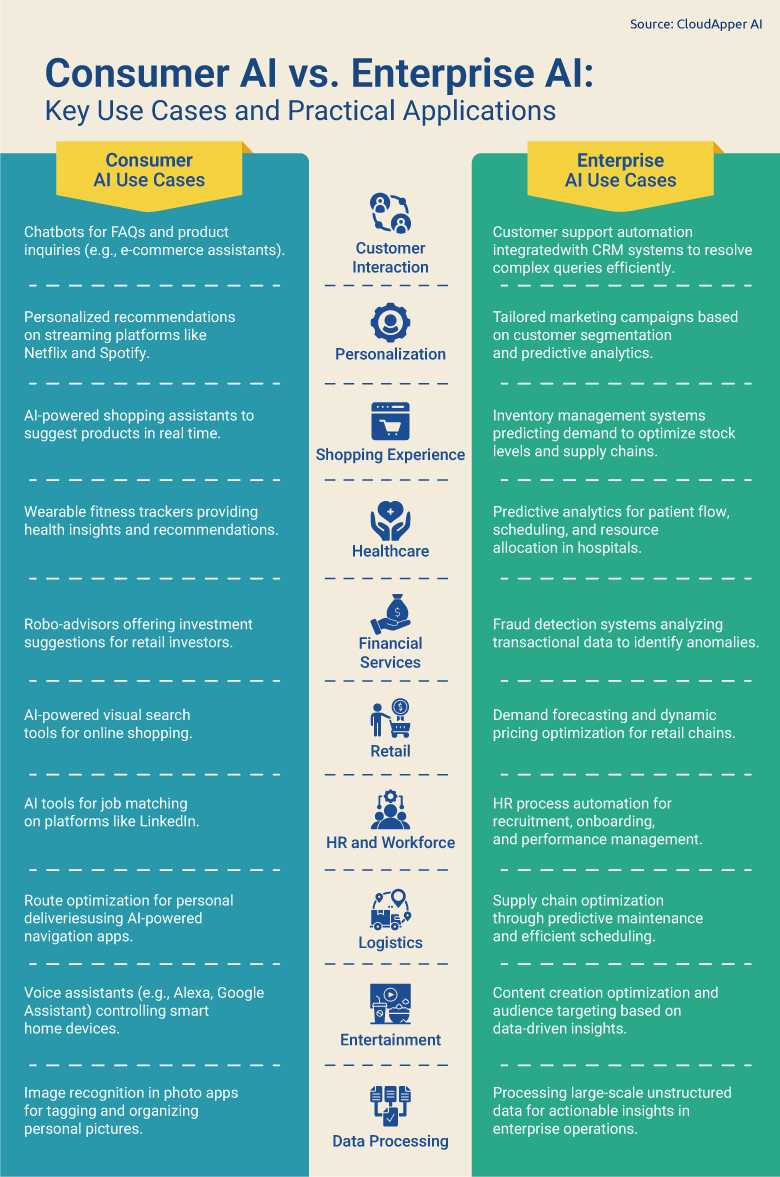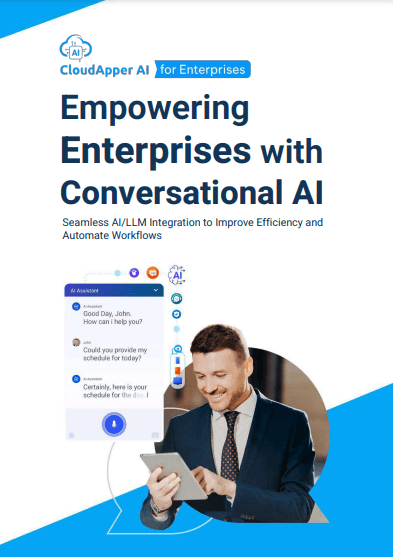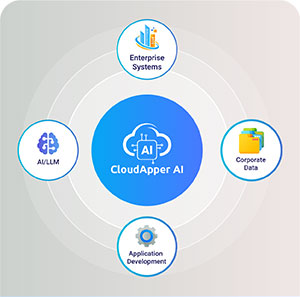Dive into the realms of Consumer AI and Enterprise AI, revolutionizing customer experience and organizational technology. CloudApper AI excels in both, enhancing CX with personalized interactions and streamlining HR processes for an empowered workforce, driving innovation across sectors.
Table of Contents
As someone with years of experience navigating the complexities of AI applications in enterprise settings, I’ve witnessed firsthand how transformative this technology can be for organizations. However, one common area of confusion among decision-makers is understanding the distinction between Consumer AI and Enterprise AI—a misunderstanding that often leads to misguided investments and missed opportunities.
This distinction is far from academic; it’s a critical consideration for industries that demand efficiency, precision, and compliance at scale. Organizations increasingly rely on innovative solutions like Enterprise AI to streamline operations, improve decision-making, and achieve long-term business objectives.
Consider this: according to a report by MarketsandMarkets, the global AI market for enterprises is projected to reach $102.7 billion by 2028, growing at a staggering CAGR of 46.2%. This rapid adoption is fueled by the need to optimize processes, enhance compliance, and unlock actionable insights. However, choosing the wrong type of AI—one designed for consumer use rather than enterprise-level challenges—can lead to inefficiencies and hinder progress.
From my experience, business leaders often grapple with balancing multiple responsibilities, including meeting operational goals, ensuring regulatory compliance, and managing resources effectively. According to a recent industry report, 80% of enterprise leaders identify workload management as one of their most significant challenges. This highlights the pressing need for tailored AI solutions that address the unique demands of complex organizational environments.
Consumer AI: Elevating Customer Experience and Product Enhancement
Consumer AI unfolds in two distinct dimensions: a) understanding customer behavior to improve Customer Experience (CX); b) leveraging data to enhance products. Early adopters, exemplified by tech giants like eBay, have witnessed substantial gains. By analyzing extensive data sets, eBay achieved a breakthrough in personalization, scaling it to every customer based on profound insights derived from 500 metrics and 50 petabytes of data.
Machine learning techniques, a subset of Consumer AI, have superseded statistical modeling, particularly in the financial domain. In consumer product industries, AI plays a pivotal role in driving new product features and achieving mass personalization through pattern recognition in large datasets. The rise of chatbots, categorized into front-end AI (bots) and AI-assisted human agents, is a notable manifestation, with 80% of sales and marketing leaders acknowledging their contribution to improving customer experience.
AI’s impact on CX extends to Responsive Retail, robo-advisors in banking, AI-powered shopping assistants in e-commerce, and more. Consumer AI has become a game-changer, with predictions of a transformative impact on customer experience.
CloudApper AI enhances Customer Experience with cutting-edge Consumer AI. By seamlessly integrating into various industries, it revolutionizes CX through personalized interactions, automates responses, and predicts customer needs, ensuring businesses stay ahead in delivering exceptional services.
Enterprise AI: Dominating Organizational Technology
The enterprise landscape witnesses the dominance of AI, shaping the Enterprise Resource Planning (ERP) ecosystem significantly. Focused on organizational outcomes, Enterprise AI solutions has grown to become a dominant force in the market. It tackles complex challenges, automating mundane tasks, performing root cause analysis, and contributing to streamlined processes.
While Consumer AI interfaces directly with customers through messengers, emails, websites, and apps, Enterprise AI is more organizational-centric, emphasizing quantifiable end value for companies. It requires deep domain expertise, often using supervised learning techniques to achieve KPI-oriented results. Notably, Enterprise AI has found its footing in areas like automated marketing budgets, fraud detection, improving employee experience and customer value prediction in sales.
CloudApper AI elevates Employee Experience through advanced Enterprise AI solutions. It streamlines HR processes, provides instant support, and automates tasks, ensuring a seamless, efficient, and empowering work environment for enhanced productivity and job satisfaction.
Infographic: Consumer AI vs. Enterprise AI: Key Use Cases and Practical Applications

How Consumer AI and Enterprise AI are Different?
Here is a comparison table in HTML format illustrating the differences between Consumer AI and Enterprise AI:
| Feature | Consumer AI | Enterprise AI |
|---|---|---|
| Primary Focus | Enhancing customer experience (CX) and personalizing user interactions. | Optimizing organizational processes, achieving business outcomes, and solving complex enterprise challenges. |
| Target Audience | Individual consumers and end-users. | Organizations, enterprises, and corporate decision-makers. |
| Data Processing | Focuses on pattern recognition in large datasets for personalized experiences. | Processes large volumes of structured and unstructured data to achieve KPI-driven outcomes. |
| Scalability | Designed for personal use with limited scalability. | Highly scalable to meet the needs of large organizations and complex systems. |
| Compliance and Security | Minimal emphasis on compliance and security; primarily consumer-focused. | Prioritizes regulatory compliance (e.g., HIPAA, GDPR) and robust data security measures. |
| Use Cases | Chatbots, virtual assistants, personalized product recommendations, robo-advisors. | Fraud detection, HR automation, predictive maintenance, ERP integration, supply chain optimization. |
| Technology | Focuses on machine learning and front-end interfaces like chatbots and voice assistants. | Uses supervised and unsupervised learning techniques with deep domain expertise. |
| Examples | Siri, Alexa, AI-powered shopping assistants, responsive retail. | Predictive analytics for facility management, automated marketing budgets, and employee experience enhancement. |
| Primary Objective | Improving customer satisfaction and personalization. | Driving operational efficiency, reducing costs, and enabling strategic decision-making. |
The differentiation is clear: Consumer AI targets a better customer experience, leveraging interfaces as its primary focus, while Enterprise AI concentrates on creating and optimizing intelligent products and solutions within organizations. 94% of business leaders think that AI will be important for business success in the next five years, according to Deloitte’s State of AI in the Enterprise, 5th edition, published in 2022.
In conclusion, the dual forces of Consumer AI and Enterprise AI are steering innovation and efficiency across diverse sectors. Recognizing the unique characteristics of each variant is vital for businesses seeking to unlock the full potential of artificial intelligence in their respective domains. As we move forward, the symbiotic relationship between Consumer AI and Enterprise AI will continue to redefine how industries operate and deliver value.
Frequently Asked Questions (FAQ)
1. What is Consumer AI?
Consumer AI refers to artificial intelligence technologies designed to enhance individual user experiences. Examples include virtual assistants like Siri and Alexa, personalized shopping recommendations, and AI-powered chatbots that interact with consumers on websites and apps.
2. What is Enterprise AI?
Enterprise AI is designed for organizations to optimize processes, improve efficiency, and achieve specific business goals. It integrates deeply into business systems like ERP, HR platforms, and supply chains, addressing challenges such as predictive maintenance, fraud detection, and compliance management.
3. How does Consumer AI differ from Enterprise AI?
The primary difference lies in their focus and application. Consumer AI enhances customer experience and personalization for individual users, while Enterprise AI focuses on streamlining organizational processes, achieving compliance, and providing scalable solutions for complex business needs.
4. Can Enterprise AI be used for customer experience improvement?
Yes, Enterprise AI can enhance customer experience, but it does so within the broader context of organizational goals. For example, it might analyze customer data to improve marketing strategies or provide insights for personalized customer support.
5. What industries benefit most from Enterprise AI?
Industries such as healthcare, manufacturing, retail, finance, and logistics greatly benefit from Enterprise AI. It helps optimize operations, ensure compliance, and improve decision-making across these sectors.
6. Is Consumer AI scalable for enterprise use?
Consumer AI is generally not designed for the scalability and security requirements of enterprise applications. While it may offer certain features, it lacks the robustness and compliance capabilities that Enterprise AI provides for large-scale operations.
7. What are some examples of Enterprise AI use cases?
Enterprise AI is used in areas such as predictive analytics for facility management, fraud detection in banking, HR process automation, supply chain optimization, and advanced ERP system integration.
8. What are the challenges of implementing Enterprise AI?
Challenges include the need for significant data processing capabilities, integration with existing systems, compliance with regulatory standards, and ensuring scalability across complex organizational structures.
What is CloudApper AI Platform?
CloudApper AI is an advanced platform that enables organizations to integrate AI into their existing enterprise systems effortlessly, without the need for technical expertise, costly development, or upgrading the underlying infrastructure. By transforming legacy systems into AI-capable solutions, CloudApper allows companies to harness the power of Generative AI quickly and efficiently. This approach has been successfully implemented with leading systems like UKG, Workday, Oracle, Paradox, Amazon AWS Bedrock and can be applied across various industries, helping businesses enhance productivity, automate processes, and gain deeper insights without the usual complexities. With CloudApper AI, you can start experiencing the transformative benefits of AI today. Learn More

CloudApper AI Solutions for HR



- Works with








- and more.
Similar Posts

What Experts Say About Enterprise Business Automation & Why You…

Enterprise Automation with AI: How to Streamline Your Business Operations



